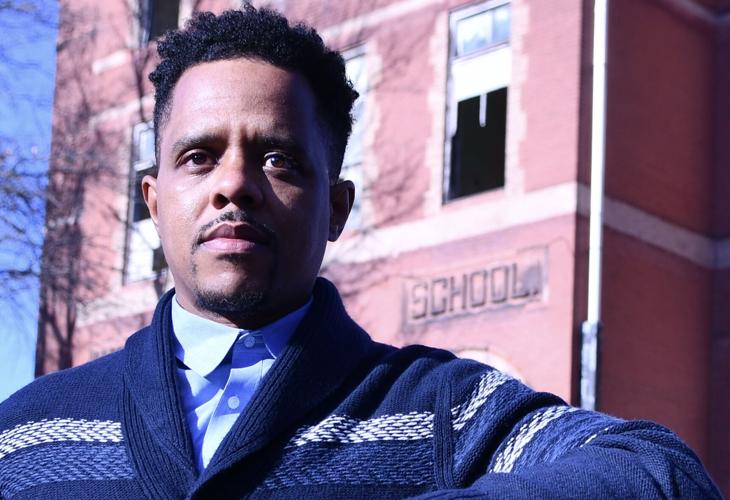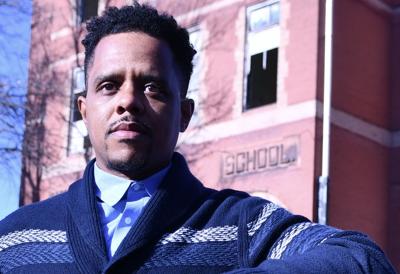
“I’m sorry, but what position am I being interviewed for?
Jameel Spann was hesitant to interrupt the interviewer, but he had difficulty understanding the caller’s intentions. He had filled out numerous applications for jobs and acceptance to colleges. So, when he received an email to schedule a phone interview, he eagerly accepted.
The interviewer, however, seemed obsessed with the crime he had committed in 2003. It wasn’t totally beyond expectations. Spann was seeking a position where he could work with felons and potential young felons. But this interviewer peppered him with questions such as: “Who was in the car with you when you assaulted a woman at gunpoint? Were you using drugs? Have you been in trouble with the law before? What was going through your mind at the time of the crime?”
Spann tried to oblige by quickly summarizing the incident, segueing to his remorse, sharing lessons he’d learned in prison and his future ambitions. But the interviewer insisted they go back, rehash the incident, and give even more details of that day.
After Spann asked about an expected job position, the caller explained that this was not an interview for a job but one for a news story. Spann immediately dropped his guards.
“Oh, I wasn’t sure,” he exhaled. “I was trying to be respectful but…”
Once past the misunderstanding, Spann freely shared his story.
The day was Sept. 29, 2003. He was a 19-year-old Fisk University student at the time. Spann was in town to attend a college football game. The next day, a Sunday, Spann, his cousin, and a friend were driving around just killing time. They were smoking marijuana which Spann later learned was laced with PCP (or phencyclidine). He doesn’t use that as an excuse for his actions, but it might explain why he participated in what he described as a “totally random” unplanned act.
As they drove through a residential area in Clayton, his friend hopped out of the slow-rolling car and placed a broken BB gun to the head of a woman who was unloading groceries from her car. Spann remembers stupidly joining his friend. They forced the woman into her house. Someone, a neighbor perhaps, called the police. As sirens blared, Spann and his friend fled the scene but both were quickly apprehended and arrested.
Spann was charged with first-degree robbery, kidnapping, burglary, and felonious restraint. He had never committed a serious crime before that day. He had support from his mother and the aunt and uncle who raised him in the Old North neighborhood. Spann had made it to college and planned to follow in the footsteps of his grandfather and other relatives who had careers in education.
His bond was set at $250,000. Spann’s uncle got a bail bondsman and managed to raise the $12,000 needed to get him out of county jail, a month after his arrest. At the time Spann was in his junior year at Fisk. He wasn’t allowed to leave the state while out on bond, so returning to college was an impossibility.
Attorney Charles C. Kirksey, who happened to be in court on the day of Spann’s sentencing described what he saw in a 2004 commentary for the St. Louis American:
“Upon Entering the hallway near the courtroom, there was an unusually large throng of African Americans of varying ages seated and standing, all neat and quiet in their appearances.” Kirksey described Spann as “a bright college sophomore attending a prominent black college.”
Kirksey expounded on the “tragic, unnecessary waste” of the three young men about to be sentenced. In particular, he mentioned Spann’s sentence of 15 years with a 85% time-served mandate.
Spann eventually landed at the Southeast Correctional Center, a maximum-security state prison in Charleston, Missouri. There, he received another kind of education. Spann realized he was grappling with depression. A cousin had just been gunned down and the murder was still eating away at him the day he committed his crime. He makes no excuses, but he realized his head wasn’t in a good place and prison didn’t make things any better.
“A lot of people in prison should be in mental health facilities,” Spann stressed. “Incarceration cuts you off mentally and literally from your family and community. My social and mental development took a major hit during my almost 13 years in a concrete box.”
“America’s jails and prisons have become de-facto mental health providers,” according to the National Alliance on Mental Health, which estimates that about “two in five people who are incarcerated have a history of mental illness.”
Spann was determined to, at least mentally, escape the “box.” At the Charleston facility, he said, it was customary for inmates to spend 23 out of 24 hours in their cells. The only way out was through extracurricular activities like chess or book clubs, or by taking classes conducted mostly by prison psychiatrists. Soon he became a tutor in those classes and, later, a facilitator with the prison’s alcohol and drug abuse programs.
Through education, Spann saw a way to shave some time off his sentence. So, when he heard about the Prison Education Project offered by Washington University, he quickly applied. After 12 years, nine months, and six days, Spann was released from prison. He has completed his undergraduate studies through the prison education project. He now plans to continue his education by taking the law school admissions test to pursue a law degree.
Spann said his passion nowadays is to make sure felons have access to higher education.
“Everyone, even felons, should have access to education but everyone doesn’t. I received a second chance because I already had some college before I was locked up,” Spann explained, adding: “But most people in prison never even receive a first chance at higher education.”
In the six years since his release, Spann and his significant other have had two young children. He lives in theSkinker-DeBaliviere neighborhood near Washington University. He has worked for the Alliance for Higher Education in Prison and volunteers with various nonprofits as an advisor or consultant, doing what he describes as “social justice work.”
Spann was recently invited by Washington University to present a local TED TALK titled: “Higher Education is a Human Right.” In his presentation, Spann detailed his dream of turning abandoned public schools into hubs of education where young African Americans can get degrees-and not just from colleges-but from organizations offering education in the trades like carpentry, welding, and construction.
The Sentencing Project, a national agency that advocates for effective and humane responses to crime, estimates that Blacks are incarcerated in state prisons at nearly 5 times the rate of white Americans.
Spann defines himself as an “abolitionist” on a mission to “alleviate the prison problem, especially for young men who share his hue. Higher education, he stressed, is the most effective way to “put prisons out of business.”
He hopes the next call from an interviewer will be the one that allows him to put his passions into practice.
“I want to create conduits for opportunities in the neighborhoods where I grew up,” Spann explained.“Lived experience is the most credible form of research on this topic. I'm a black man who’s been to prison and wants nothing more than a chance to create opportunities for others like me.”






















(0) comments
Welcome to the discussion.
Log In
Keep it Clean. Please avoid obscene, vulgar, lewd, racist or sexually-oriented language.
PLEASE TURN OFF YOUR CAPS LOCK.
Don't Threaten. Threats of harming another person will not be tolerated.
Be Truthful. Don't knowingly lie about anyone or anything.
Be Nice. No racism, sexism or any sort of -ism that is degrading to another person.
Be Proactive. Use the 'Report' link on each comment to let us know of abusive posts.
Share with Us. We'd love to hear eyewitness accounts, the history behind an article.